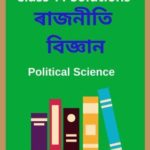Class 11 Political Science MCQ Chapter 11 Political Theory: An Introduction Solutions to each chapter is provided in the list so that you can easily browse through different chapters Class 11 Political Science MCQ Chapter 11 Political Theory: An Introduction Notes and select need one. Class 11 Political Science MCQ Chapter 11 Political Theory: An Introduction Question Answers Download PDF. NCERT Political Science MCQ Class 11 Solutions.
Class 11 Political Science MCQ Chapter 11 Political Theory: An Introduction
Also, you can read the NCERT book online in these sections Solutions by Expert Teachers as per Central Board of Secondary Education (CBSE) Book guidelines. AHSEC Class 11 Political Science Part – I and Part – II MCQ Solutions are part of All Subject Solutions. Here we have given NCERT Class 11 Political Science Multiple Choice Notes, Assam Board Class 11 Political Science Objective Type Solutions for All Chapters, You can practice these here.
Political Theory: An Introduction
Chapter: 11
| (PART-B) POLITICAL THEORY |
| MCQ |
1. Which of the following is one of the main concepts of political theory?
(a) Multiculturalism.
(b) Racism.
(c) Federalism.
(d) Philosophy.
Ans: (a) Multiculturalism.
2. Mark the correct statement related to the Traditional View of politics.
(a) Politics is the study of state and the government.
(b) Study of analysis of the whole political system.
(c) Class struggle between haves and haves not.
(d) Relationship between an environment and the system.
Ans: (a) Politics is the study of state and the government.
3. The term ‘Politics’ is derived from:
(a) Latin word ‘Polis’.
(b) Greek word ‘Polis’.
(c) (c) English word ‘Political.
(d) Greek word ‘City-State’.
Ans: (b) Greek word ‘Polis’.
4. In ancient times, which word was used for the term ‘Political Science”?
(a) Theory.
(b) Status.
(c) Politics.
(d) Law.
Ans: (c) Politics.
5. Scope of Political Theory is:
(a) Study of power.
(b) To determine the political principles.
(c) Study of state and government.
(d) All of the of above.
Ans: (d) All of the of above.
6. The concept of “separation of powers” is given by:
(a) Plato.
(b) Rousseau.
(c) Aristotle.
(d) Montesquieu.
Ans: (d) Montesquieu.
7. Scope of Political Theory is:
(a) Study of power.
(b) To determine the political principles.
(c) Study of state and government.
(d) All of the above.
Ans: (d) All of the above.
8. Theory is derived from the word “Theoria’ which is taken from:
(a) Greek word.
(b) English word.
(c) Roman word.
(d) Latin word.
Ans: (a) Greek word.
9. A new threat to freedom that has emerged in the contemporary world is:
(a) Colonialism.
(b) Slavery.
(c) Terrorism.
(d) Gender discrimination.
Ans: (c) Terrorism.
10. To deal with the challenge of communalism, we need to inculcate.
(a) Discipline.
(b) Liberalism.
(c) Tolerance.
(d) Truthfulness.
Ans: (c) Tolerance.
11. Identify the thinker associated with the Modern Approach.
(a) David Easton.
(b) Plato.
(c) Aristotle.
(d) Socrates.
Ans: (a) David Easton.
12. Identify the leader who advocated the cause of the scheduled castes.
(a) Machiavelli.
(b) B.R. Ambedkar.
(c) Karl Marx.
(d) Aristotle.
Ans: (b) B.R. Ambedkar
13. Who started the Lyceum?
(a) Gandhi.
(b) Ambedkar.
(c) Aristotle.
(d) Plato.
Ans: (c) Aristotle.
14. The term Politics is derived from:
(a) Latin word ‘Polis.
(b) Engl;ish word ‘Political.
(c) Greek word ‘Polis.
(d) Greek word ‘City State.
Ans: (c) Greek word ‘Polis.
15. Identify the leader who advocated the cause of the scheduled castes.
(a) Machiavelli.
(b) B.R Ambedkar.
(c) Karl Marx.
(d) Aristotle.
Ans: (b) B.R. Ambedkar.

Hi! my Name is Parimal Roy. I have completed my Bachelor’s degree in Philosophy (B.A.) from Silapathar General College. Currently, I am working as an HR Manager at Dev Library. It is a website that provides study materials for students from Class 3 to 12, including SCERT and NCERT notes. It also offers resources for BA, B.Com, B.Sc, and Computer Science, along with postgraduate notes. Besides study materials, the website has novels, eBooks, health and finance articles, biographies, quotes, and more.


